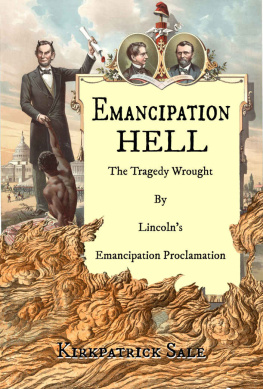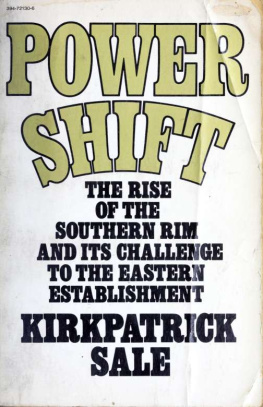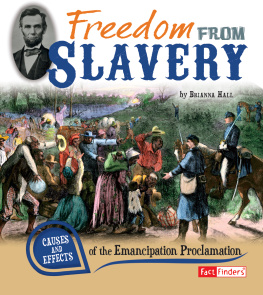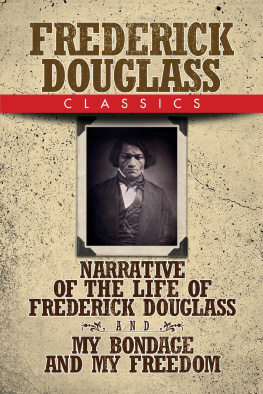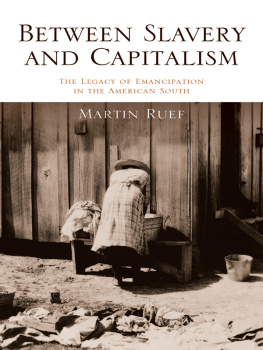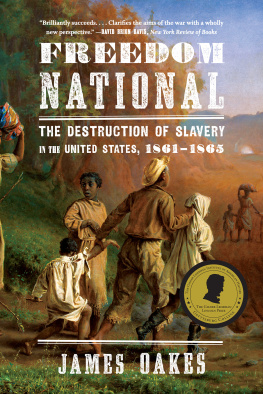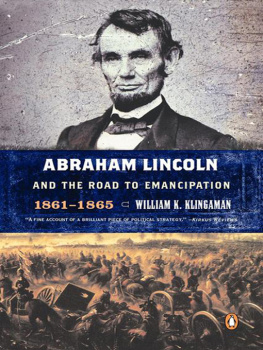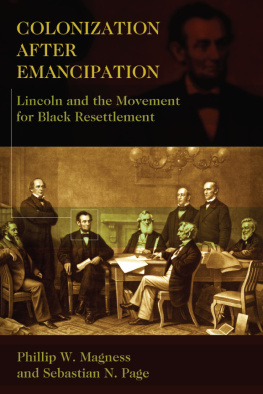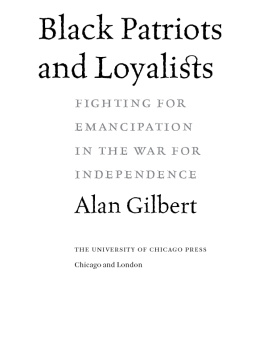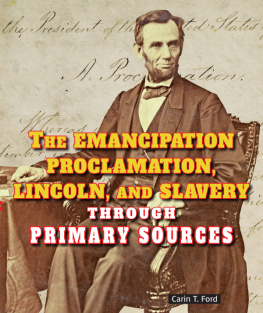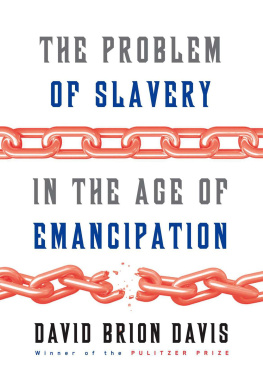E mancipation
Hell
The Tragedy Wrought
by
Lincolns
Emancipation Proclamation
Kirkpatrick Sale
SHOTWELL PUBLISHING
Copyright 2015 Kirkpatrick Sale
ALL RIGHTS RESERVED. No part of this publication may be reproduced, distributed, or transmitted in any form or by any means, including photocopying, recording, or other electronic or mechanical methods, or by any information storage and retrieval system without the prior written permission of the publisher, except in the case of very brief quotations embodied in critical reviews and certain other noncommercial uses permitted by copyright law.
Produced in the Republic of South Carolina by
SHOTWELL PUBLISHING LLC
Post Office Box 2592
Columbia, So. Carolina 29202
Cover Design based on Emancipation Proclamation, Lithograph. (J.S. Smith & Company, 1890) and executed by Boo Jackson Designs.
This edition is an AUTHORIZED REISSUE of the authors 2012 self-published work Emancipation Hell: The Tragedy Wrought by Lincolns Emancipation Proclamation. 150 Years Ago .
Publishers Note
SHOTWELL PUBLISHING would like to publicly thank and personally acknowledge the generosity of the author, Kirkpatrick Sale, for allowing us to repackage, reformat, and reissue this important, timely, and iconoclastic work.
As affairs have turned, it is the central act of my administration, and the great event of the nineteenth century.
Abraham Lincoln to Francis Carpenter, 1864
An annihilation of individual property rights without parallel in the history of the modern world.
R. R. Palmer, A History of the Modern World, 1950
I. Emancipation Hell, 1862
THE SUMMER OF 1862 was particularly hot in Washington, D.C., and Abraham Lincoln spent as little time in the stuffy White House as he could, preferring to spend his evenings at the cottage at the Soldiers' Home a few blocks to the north. But on Tuesday, July 22, he ordered a special meeting of his seven-man cabinet there, in the oval library on the second floor instead of his own office on the first, an indication that he felt a little sense of ceremony was appropriate.
"I said to the cabinet," Lincoln recalled later, "that I had resolved upon this step, and had not called them together to ask their advice, but to lay the subject-matter of a proclamation before them." A proclamation, he said, on "the adoption of the emancipation policy." Emancipation. Finally, it seemed, the President was taking the bold step that so many radicals in his party and most of the abolitionists throughout the North had been urging upon him for the better part of the last year, his first in office.
The reaction was a careful silence. "Little was said," remembered Gideon Welles, the Navy Secretary, "by any one but the President." He proceeded to read from two sheets of lined vellum on which he had written in his small, careful hand a sort of legal document, two pages long, with none of the grandeur and elegance he would evince in other statements. It was, he asserted, a "war measure," taken under his authority as Commander-in-Chief, and had no need to acquire Congressional assent. After all, if he had used his war powers to bypass Congress to suspend habeas corpus, as he did in April 1861, to arrest and imprison perhaps 15,000 Northern critics without trial, to shut down more than 300 newspapers for varying periods, to censor telegraph communication, to issue postal censorship, to create a naval blockade of the South, to declare martial law in Delaware, and to invade Maryland and rig elections there to keep it from secedingand, as a matter of fact, to declare war without Congressional authorizationthen why should this be any more problematic?
The first paragraph was a dry assent to a bill Congress had passed a few days earlier allowing confiscation of property of those "participating in, aiding, countenancing, or abetting the existing rebellionas within and by said sixth section provided." Nothing here, they must have thoughtthis couldn't be why a special cabinet session was called. The second paragraph turned to a scheme Lincoln had advanced before, getting Congress to pass a law giving Federal aid to any Southern states that would recognize the Union and voluntarily adopt the "gradual abolishment of slavery," a measure to restore the Union, the reason that "the war, as it has been, will be, prosecuted." Nothing here, eitherevery man there had heard this idea and knew it had scant support in the legislature.
But then Lincoln turned the page and announced, "And, as a fit and necessary military measure for effecting this object, I do order and declare that on the first day of January in the year of Our Lord one thousand, eight hundred and sixty-three, all persons held as slaves within any state or states" in rebellion from the United States shall then, thenceforward, and forever, be free."
The logic was not precisely clearit did not seem that the abolition of slavery in seceding states would necessarily promote the cause of unionbut this was indeed something new for the Federal government: a declaration that it had the power to rescind the laws of states in secession because it was fighting a war against them, and that in wartime the confiscation, or liberation, of the enemy's property could be held to be legitimate. A modern nationalistic state was taking shape, one absorbing power from the states into its center, and willing to declare and fight a war to achieve it.
Mark you, the declaration did not apply to the states not in rebellion where slavery flourished (Maryland, Delaware, Kentucky, and Missouri) because at its heart its intent was not so much to create free people as to foster slave rebellions in the South (especially on plantations whose owners had gone to war) and to disrupt the food production on which the Confederate army depended. (Lincoln the politician also had no desire to alienate slave-owners in the Border States who were, after all, men whose votes he would need at the next election.) In other words, as Secretary of State William Seward remarked ironically at the time,
We show our sympathy with slavery by emancipating slaves where we cannot reach them and holding them in bondage where we can set them free.
Nonetheless, the cabinet members were receptive to the proclamation, with only a few demurs. Attorney General Edward Bates argued that it had to go hand in hand with compulsory colonization, a resettlement of freed slaves to South America or Africa, an idea that Lincoln had previously championed but without support from a Congress that feared the cost; Treasury Secretary Salmon Chase worried that its sweeping power to annul state laws would not be upheld by Federal courts, a fear that Lincoln had earlier expressed, and that "universal emancipation" would set off "depredation and massacre" across the South; Seward said that it seemed like "the last measure of an exhausted government" and should not be issued until some signs of Union success on the battlefield, lest the public regard it as without any effect, as, he pointed out, the famous papal bull against Halley's comet.
Lincoln heard their responses but was not inclined to engage in a long discussion. He had come to announce his decision, not to ask for advice. In fact, he was inclined to issue the proclamation the next day, and only a fervent plea by Seward at a meeting that evening persuaded him to delay. But only for the opportune moment, the right Union success, and he figured that would not be long. For this was something that, as a "military measure," he was determined to do when the time was right.
Lincoln grew impatient enough after waiting two months to decide to regard the clash between General George McClellan and the Confederacy's General Robert Lee at Sharpsburg, Marylandwhen Lee was forced to retreat across the Potomac on September 17 after a full day of battleas a Union victory. True, Lee's Army of Northern Virginia was driven out of Maryland into Virginia, and it did suffer immense casualties of over 10,000 (perhaps 2,700 killed), including his wife Marys half -brother, but McClellan didn't take the chance to cross the river and drive it back farther, and his troops had similar vast casualties of more than 12,000 (maybe 2,108 killed). Pretty much a standoff, and it is hard to see, with such awful slaughter as thatwhat would turn out to be the deadliest single day in the history of American warfarehow a reasonable man could regard that as a victory for anyone. Nonetheless, Lincoln chose to overlook this unprecedented immensity of bloodshed, foreshadowing a war of unprecedented gore, and proclaimed the Sharpsburg standoff a Union triumph.

